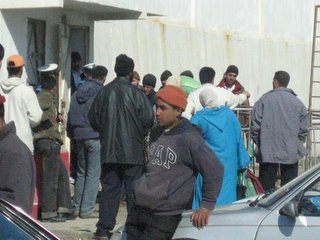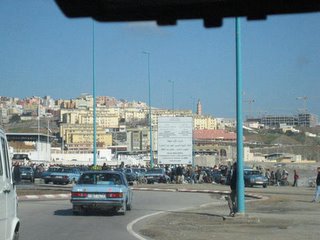
I awoke Monday morning to the sunny Mediterranean Sea just coming into view… a greenish blue calm settling over me, accented by the surprising silence of the 15 of us in the van. It was a long four days, and as we drove along the road bordering the sea I think we were all thinking about how exhausted, dirty, and changed we felt. Either that, or we were sleeping.
The view was what you might imagine of the Mediterranean: green grass, blue water, sun, a jagged coastline dotted with buildings in the Andalucía-white style. We were headed from the little mountainous town of Chefchaouen to the port, which happens to be in Ceuta, a city in the only region of Morocco still owned by Spain. The poverty of Morocco continued along the sea as we drove, little shacks and souvenir stands on what would be couple-million-dollar property in California. The people were plentiful, walking along the road, most women veiled and most men robed. Where they were going, I don’t know. The parking lot before the border between Morocco and Spain presented the same mystery. It was filled with people, some selling wares, some waiting, and many starting at the 15 of us as we unloaded the van and made our way to the border windows. As we were waiting for our departure from Morocco to be verified, the line of pushing and shoving Moroccans waiting to get across the border got longer and louder. When my passport was stamped and ready, I followed my professor to the front of the line, and watched as the border official yelled at people in Arabic and beat them back to make way for me and my fellow, legal American travelers. We walked rapidly along the sidewalk of the no-man’s zone bordered by high fences and barbed wire, until we finally passed the gate into Spain, the ocean still adjacent but barely visible over the walls and fences surrounding us.

This border between Morocco and Spain in Africa “el tarajal” is the most unequal in the world. The difference in per capita income between third-world Morocco and first-world Spain is astronomical, and this small seaside town of Ceuta is where it all comes to a head. I knew Moroccans had problems getting permission to travel to other countries, because I had several conversations about the matter with three Moroccan friends a few days before in Rabat (the capital). But I wasn’t prepared for the extreme confusion, the frustration, the desperation I saw in the faces and actions of the people at the border. I have no idea what was going on; the languages these nameless faces spoke were French and Moroccan Arabic…possibly others…and it was obvious that the border guards weren’t keen on letting them through for whatever reason. Well, for security reasons, for law reasons, for income and political and nationality and motivation reasons. Maybe not for fairness reasons.

It’s hard for me to understand. I was fortunate enough to be born in the United States, so I’m allowed to travel anywhere in the world at my leisure with my navy blue VIP pass. People like my friend Amine, a bright, motivated Moroccan student about my age who is fluent in Moroccan Arabic, French, and English has never traveled out of Morocco, and probably never will. Another friend Adnan is lucky enough to have traveled to the U.S. and Europe, and he’s hoping to study chemical engineering at UC Berkeley. But even though his family is in the higher level of income in the country, visas out of Morocco are hard to come by.
Yet they’re amazingly welcoming. I only saw this dissatisfaction and desperation in my last taste of Morocco. If I had written Sunday I would have started with this: (see above)
Photos in this post courtesy of Señor Esteban (who also has something to say about Morocco if you're interested). Thank you!

1 comment:
SAME thing with Bosnia and traveling. :)
YOU'RE HAVING THE TIME OF YOUR LIFE!!!!!!
don't you LOVE traveling??????????
Post a Comment